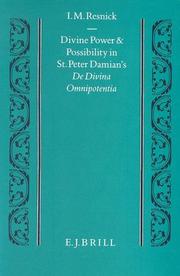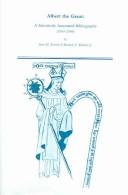| Listing 1 - 10 of 17 | << page >> |
Sort by
|

ISBN: 9004095721 900445067X Year: 1992 Volume: 31 Publisher: Leiden Brill
Abstract | Keywords | Export | Availability | Bookmark
 Loading...
Loading...Choose an application
- Reference Manager
- EndNote
- RefWorks (Direct export to RefWorks)
God (Christianity) --- Dieu (Christianisme) --- Omnipotence --- History of doctrines --- Histoire des doctrines --- Peter Damian, --- 2 PETRUS DAMIANUS --- 231.133.2 --- God --- -Metaphysics --- Misotheism --- Monotheism --- Religion --- Theism --- Godsdienst. Theologie--PETRUS DAMIANUS --- Operatieve eigenschappen van God: almacht; alwetend; barmhartig; rechtvaardig; God als wil; God als liefde --- -History of doctrines --- -Peter Damian Saint --- -Godsdienst. Theologie--PETRUS DAMIANUS --- 2 PETRUS DAMIANUS Godsdienst. Theologie--PETRUS DAMIANUS --- 231.133.2 Operatieve eigenschappen van God: almacht; alwetend; barmhartig; rechtvaardig; God als wil; God als liefde --- -231.133.2 Operatieve eigenschappen van God: almacht; alwetend; barmhartig; rechtvaardig; God als wil; God als liefde --- Christianity --- Trinity --- Middle Ages, 600-1500 --- Peter Damian, Saint, 1007?-1072. De divina omnipotentia. --- God - Omnipotence - History of doctrines - Middle Ages, 600-1500. --- Middle Ages, 500-1500
Book
ISBN: 9789004234079 9004234071 9004239731 1283855119 9789004239739 9781283855112 Year: 2013 Volume: 38 Publisher: Leiden Brill
Abstract | Keywords | Export | Availability | Bookmark
 Loading...
Loading...Choose an application
- Reference Manager
- EndNote
- RefWorks (Direct export to RefWorks)
Albert the Great (Albertus Magnus; d. 1280) is one of the most prolific authors of the Middle Ages, and the only scholar to be known as “the Great” during his own lifetime. As the only Scholastic to have commented upon all the works of Aristotle, Albert is also known as the Universal Doctor (Doctor Universalis) for his encyclopedic intellect, which enabled him to make important contributions not only to Christian theology but also to natural science and philosophy. The contributions to this omnibus volume will introduce students of philosophy, science, and theology to the current state of research and multiple perspectives on the work of Albert the Great. Contributors include Jan A. Aertsen, Henryk Anzulewicz, Benedict M. Ashley, Miguel de Asúa, Steven Baldner, Amos Bertolacci, Thérèse Bonin, Maria Burger, Markus Führer, Dagmar Gottschall, Jeremiah Hackett, Anthony Lo Bello, Isabelle Moulin, Timothy Noone, Mikołaj Olszewski, B.B. Price, Irven M. Resnick, Francisco J. Romero Carrasquillo, H. Darrel Rutkin, Steven C. Snyder, Michael W. Tkacz, Martin J. Tracey, Bruno Tremblay, David Twetten, Rosa E. Vargas and Gilla Wöllmer
Albertus, --- Albert le Grand, --- Albert, --- Alberthus, --- Alberto, --- Albertus Magnus, --- Magnus Albertus, --- Velikiĭ Albert, --- Albert le Grand --- PHILOSOPHY / History & Surveys / Medieval. --- Saints.
Book
ISBN: 0813219701 9780813219707 9780813219691 0813219698 Year: 2012 Publisher: Washington Catholic University of America Press
Abstract | Keywords | Export | Availability | Bookmark
 Loading...
Loading...Choose an application
- Reference Manager
- EndNote
- RefWorks (Direct export to RefWorks)
Church history --- Human body --- Physiognomy --- Christianity and other religions --- Judaism --- Brotherhood Week --- Christianity --- Religious aspects --- Christianity. --- Social aspects --- Judaism. --- Relations --- Middle Ages, 600-1500 --- Face reading --- Metoposcopy --- Characters and characteristics --- Psychology --- Face --- Pathognomy --- Phrenology --- Jews --- Religions --- Semites --- Body, Human --- Human beings --- Body image --- Human anatomy --- Human physiology --- Mind and body --- Religious aspects&delete& --- Relations&delete& --- Religion --- Judaïsme --- Christianisme --- Physiognomonie --- Corps humain --- Eglise --- Aspect religieux --- Aspect social --- Histoire
Book
Year: 1988
Abstract | Keywords | Export | Availability | Bookmark
 Loading...
Loading...Choose an application
- Reference Manager
- EndNote
- RefWorks (Direct export to RefWorks)
Article
Abstract | Keywords | Export | Availability | Bookmark
 Loading...
Loading...Choose an application
- Reference Manager
- EndNote
- RefWorks (Direct export to RefWorks)
Book
ISBN: 9780874622492 0874622492 Year: 2010 Volume: 46 Publisher: Milwaukee Marquette university press
Abstract | Keywords | Export | Availability | Bookmark
 Loading...
Loading...Choose an application
- Reference Manager
- EndNote
- RefWorks (Direct export to RefWorks)
Science --- Science, Medieval --- Four elements (Philosophy) --- Methodology --- Aristotle --- De causis proprietatum elementorum --- Medieval science --- Elements, Four (Philosophy) --- Cosmology --- Matter --- Ontology --- Philosophy --- Substance (Philosophy) --- Aristoteles --- Aristote --- Aristotile --- De causis proprietatum elementorum. --- On the causes of the properties of the elements --- De proprietatibus elementorum --- De elementis --- Arisṭāṭṭil --- Aristo, --- Aristotel --- Aristotele --- Aristóteles, --- Aristòtil --- Arisṭū --- Arisṭūṭālīs --- Arisutoteresu --- Arystoteles --- Ya-li-shih-to-te --- Ya-li-ssu-to-te --- Yalishiduode --- Yalisiduode --- Ἀριστοτέλης --- Αριστοτέλης --- Аристотел --- ארסטו --- אריםטו --- אריסטו --- אריסטוטלס --- אריסטוטלוס --- אריסטוטליס --- أرسطاطاليس --- أرسططاليس --- أرسطو --- أرسطوطالس --- أرسطوطاليس --- ابن رشد --- اريسطو --- Pseudo Aristotele --- Pseudo-Aristotle --- アリストテレス --- Science - Methodology - Early works to 1800 --- Science, Medieval - Early works to 1800 --- Four elements (Philosophy) - Early works to 1800 --- Aristotle - Spurious and doubtful works

ISBN: 0866983120 9780866983129 Year: 2004 Volume: 269 Publisher: Tempe Arizona center for medieval and renaissance studies
Abstract | Keywords | Export | Availability | Bookmark
 Loading...
Loading...Choose an application
- Reference Manager
- EndNote
- RefWorks (Direct export to RefWorks)
Albertus, --- Albert, --- Alberthus, --- Alberto, --- Albertus Magnus, --- Magnus Albertus, --- Velikiĭ Albert, --- Bibliographie --- Albertus Magnus O.P. --- Albertus, - Magnus, Saint, - 1193?-1280 - Bibliography --- Albertus, - Magnus, Saint, - 1193?-1280
Book
ISBN: 9780813228594 081322859X Year: 2016 Publisher: Washington, D.C. Catholic University of America Press
Abstract | Keywords | Export | Availability | Bookmark
 Loading...
Loading...Choose an application
- Reference Manager
- EndNote
- RefWorks (Direct export to RefWorks)
Robert of Arbrissel (d. 1117) once named Cluny among the chief holy places of Christendom--just after Bethlehem, Jerusalem, and Rome. When Peter the Venerable (d. 1156) became the ninth abbot of Cluny in 1122, Cluny had thousands of monks in the mother abbey and her daughter cells, along with hundreds of affiliated houses and dependencies in England, Germany, Spain, Italy and the Holy Land. As a fierce advocate for Cluny against its detractors (which included the redoubtable Bernard of Clairvaux), Peter defended his Order at the same time that he reformed its customs. Peter the Venerable's extensive literary legacy includes poems, a large epistolary collection, and polemical treatises. The first of his four major polemics targeted a Christian heresy, the Petrobrussians (Against the Petrobrusians); the rest took aim at Jews and Saracens. Catholic University of America Press has published his Against the Inveterate Obduracy of the Jews. This present volume will make available in their entirety Peter the Venerable's twin polemics against Islam--A Summary of the entire heresy of the Saracens and Against the sect of the Saracens--as well as related correspondence. These works resulted from a sustained engagement with Islam begun during Peter's journey to Spain in 1142-43. There the abbot commissioned a translation of sources from the Arabic, the so-called Toledan Collection, that include the Letter of a Saracen with a Christian Response (from the Apology of [Ps.] Al-Kindi); Fables of the Saracens (a potpourri of Islamic hadith traditions); and Robert of Ketton's first Latin translation of the whole of the Qur'an. Thanks to Peter's efforts, from the second half of the twelfth century Christians could acquire a far better understanding of the teachings of Islam, and Peter may rightly be viewed as the initiator of Islamic studies in the West. -- Amazon.com.
Christianity and other religions --- Islam --- 2 PETRUS VENERABIUS --- 2 PETRUS VENERABIUS Godsdienst. Theologie--PETRUS VENERABIUS --- Godsdienst. Theologie--PETRUS VENERABIUS --- Relations --- Christianity --- Controversial literature --- Apologie. --- Christianity. --- Interfaith relations. --- Islam. --- Sarazenen. --- Controversial literature. --- Petrus,
Book
ISBN: 9782503581514 250358151X 9782503581521 Year: 2018 Publisher: Turnhout Brepols
Abstract | Keywords | Export | Availability | Bookmark
 Loading...
Loading...Choose an application
- Reference Manager
- EndNote
- RefWorks (Direct export to RefWorks)
The Fourth Lateran Council (1215) was groundbreaking for having introduced to medieval Europe a series of canons that sought to regulate encounters between Christians and Jews and Muslims. Its canon 68 demanded that Jews and Muslims wear distinguishing dress, in order to prevent Christians from entering into illicit sexual relations with them, restricted the movement of Jews in public spaces during Holy Week, and exhorted secular authorities to punish Jews who in any way “insult” or blaspheme against Christ himself. Other canons sought to exercise greater control over moneylending, to provide relief to Christian borrowers, to extract tithes from Jews who held Christian properties as pledges, and prohibited Jews from exercising power as public officials over Christians. The canons condemned converts who preserved elements from their former religion, promoted a fifth Crusade to the East, exempted Crusaders from taxes and from interest payments to Jewish moneylenders, restricted trade with Muslims or Saracens, and condemned Christians who provided arms or assistance to Saracens. The Council’s canons affected the missionary efforts of the late medieval Church and its attempts to convert Jewish and Muslim minorities, and established essential guidance on minority relations not to be surpassed until Vatican II in the 1960s.
Church history --- Christianity and other religions --- Judaism --- Jews --- Antisemitism --- Muslims --- Congresses --- Congresses. --- History --- Relations --- Christianity --- History. --- Innocent --- Catholic Church --- Doctrines --- Lateran Council --- Europe --- Social conditions --- 262.5*22 --- 297.116*1 --- 296*813 --- 296*813 Christelijk antisemitisme --- Christelijk antisemitisme --- 262.5*22 Lateranen IV--(1215) --- Lateranen IV--(1215) --- 297.116*1 Relatie Islam tot Christendom --- Relatie Islam tot Christendom
Book
ISBN: 0813221307 9780813221304 0813221293 9780813221298 Year: 2013 Volume: 14 Publisher: Washington Catholic University of America Press
Abstract | Keywords | Export | Availability | Bookmark
 Loading...
Loading...Choose an application
- Reference Manager
- EndNote
- RefWorks (Direct export to RefWorks)
| Listing 1 - 10 of 17 | << page >> |
Sort by
|

 Search
Search Feedback
Feedback About UniCat
About UniCat  Help
Help News
News